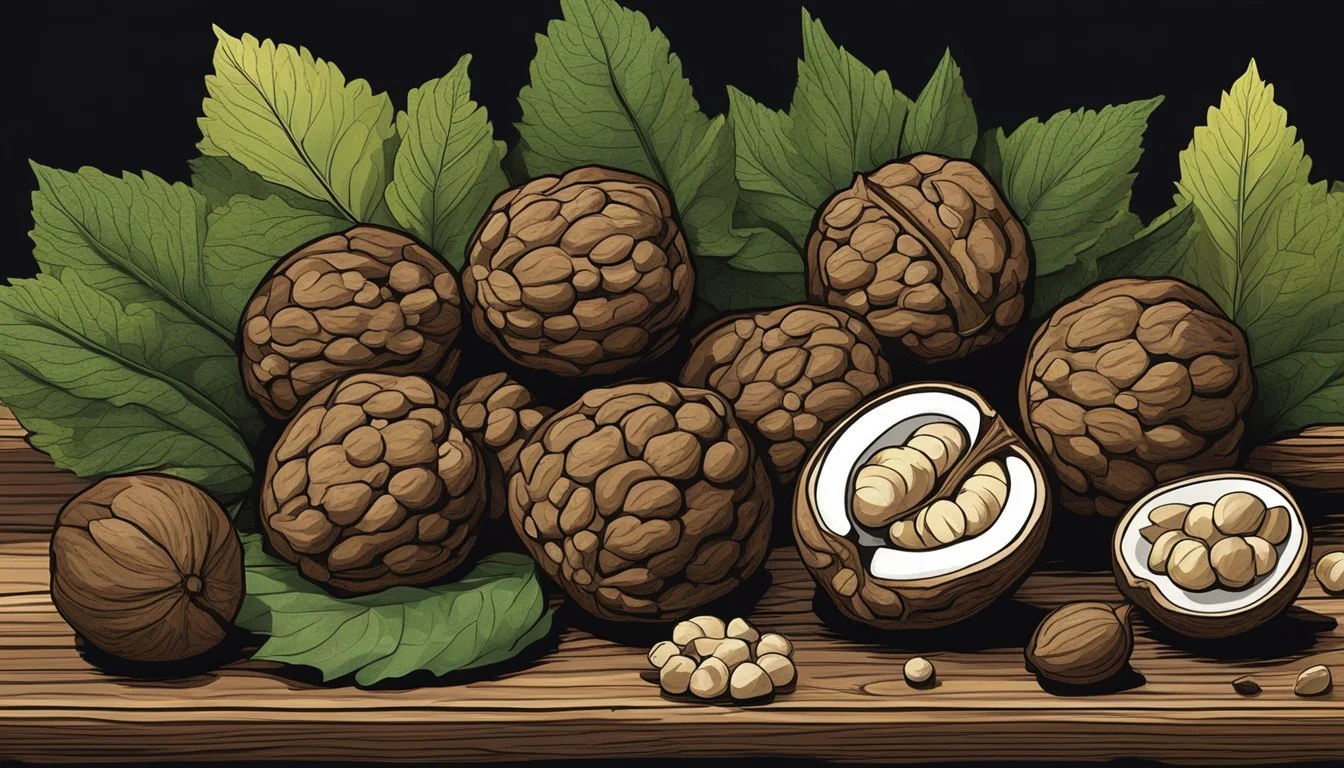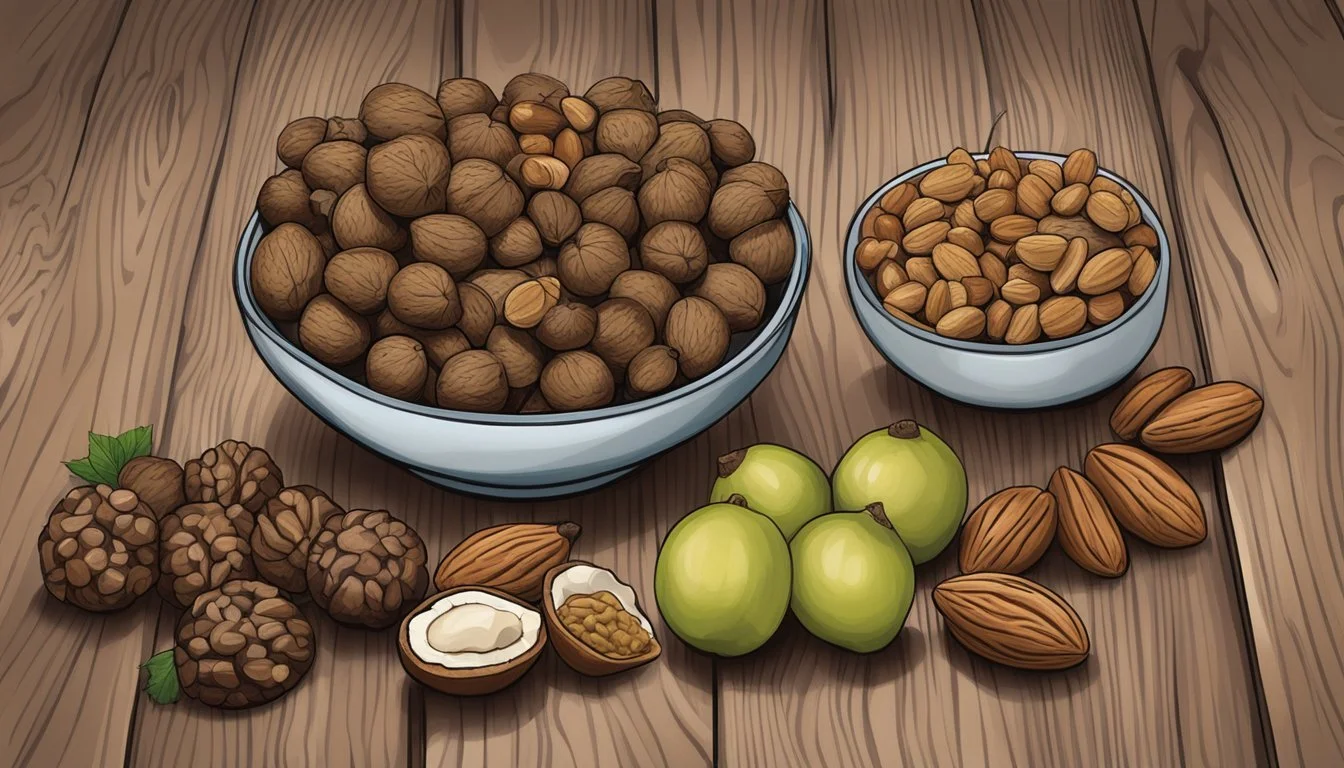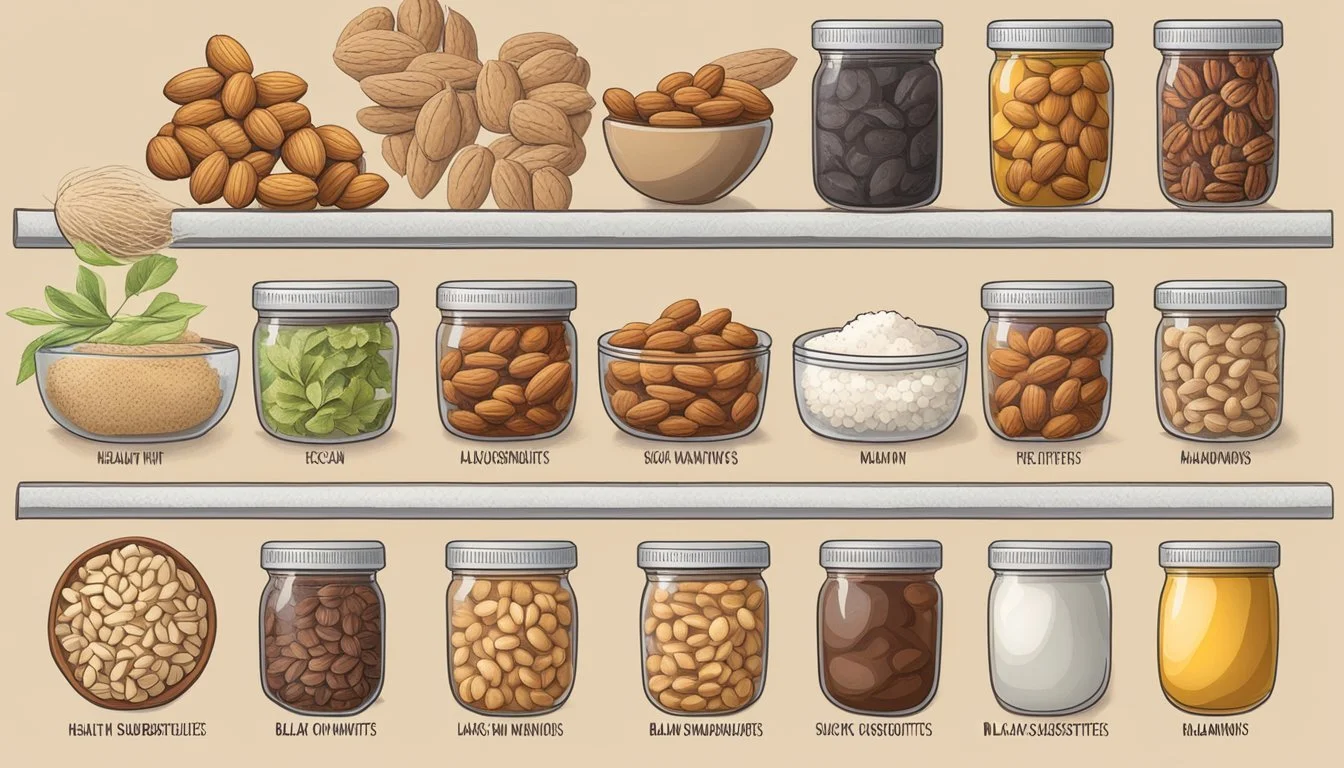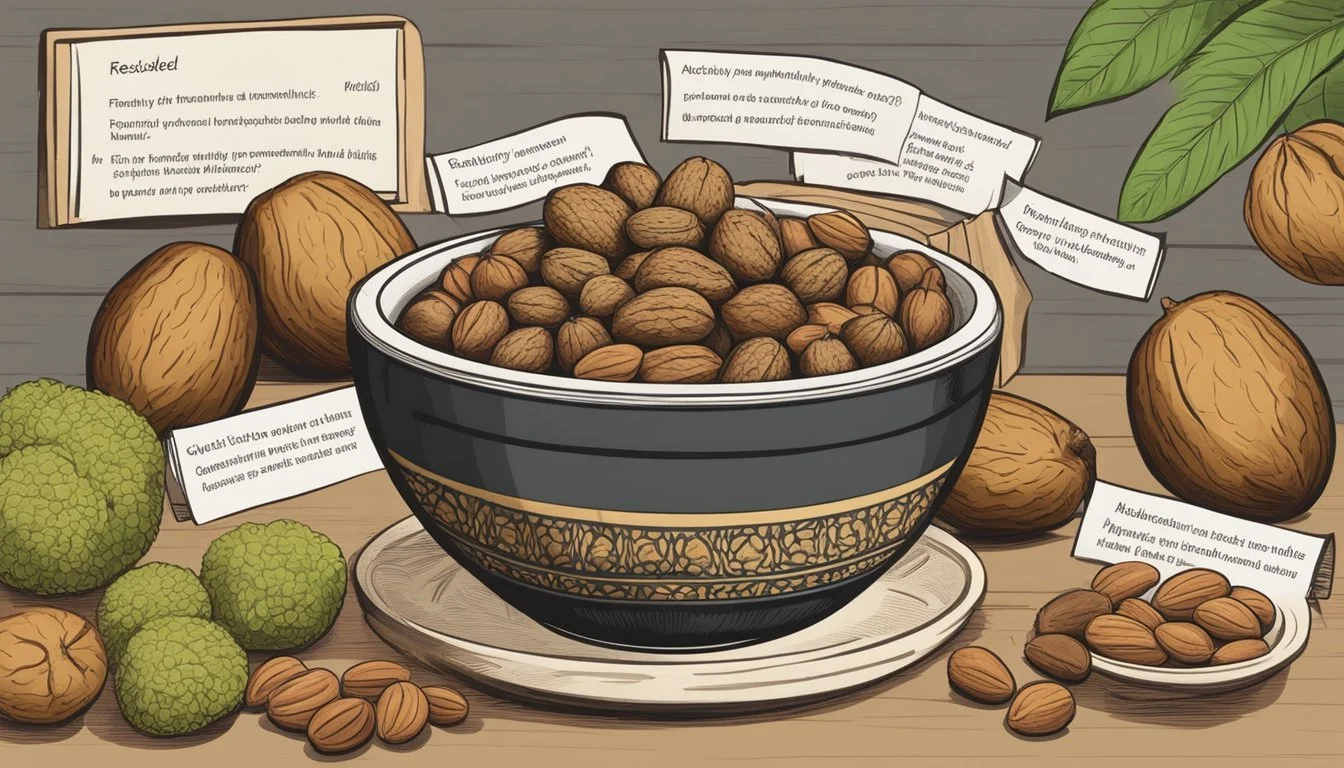Black Walnuts Substitutes
Top Alternatives for Baking and Cooking
Black walnuts are known for their distinctive earthy flavor, which can elevate a multitude of dishes, from baked goods to savory creations. They are appreciated by culinary enthusiasts for their bold, intense taste and the depth they add to favorite recipes. However, black walnuts are not always readily available due to their seasonal nature and regional availability, prompting cooks and bakers to seek suitable substitutes that can mimic or complement their unique flavor profile in cooking and baking.
When looking for walnut substitutes, it's essential to consider the desired outcome of the recipe, as different alternatives can provide varying flavors, textures, and nutritional profiles. Certain nuts like pecans can offer a similar texture and taste, making them an excellent direct replacement in recipes that call for walnuts. Pecans are often preferred for their richer, slightly more savory flavor, which can enrich a recipe without altering its intended essence.
For those opting for nut-free alternatives, seeds such as pumpkin, sunflower, sesame, flax, or chia can be considered, each bringing their own distinctive taste and benefits. In baking, seeds can be used to replace crushed walnuts, thereby maintaining the crunch and bulk that walnuts typically provide. It allows for a seamless integration into recipes, ensuring that the end result still resonates with the original dish's appeal.
Understanding Black Walnuts
Black walnuts possess a unique nutrition and flavor profile that sets them apart from other tree nuts. They are not only valued for their taste but also for their health benefits, rich in Omega-3 fatty acids and antioxidants.
Nutritional Profile
Black walnuts are a nutritional powerhouse, dense with beneficial fatty acids and minerals. Specifically, they are an excellent source of Omega-3 fatty acids which contribute to heart health and brain function. Regarding their mineral content, black walnuts provide substantial levels of magnesium, potassium, and iron. Their antioxidant properties help in combating oxidative stress in the body, thanks to the presence of polyphenols and other bioactive compounds.
Omega-3 Fatty Acids: Crucial for reducing inflammation
Antioxidants: Protect cells from damage
Minerals: Essential for overall health
Distinct Flavor Characteristics
The flavor of black walnuts is robust and complex, often described as earthly with a hint of wildness. In contrast to the milder taste of English walnuts, black walnuts deliver an intense taste and texture experience that can transform a recipe. Their bold flavor is traditionally savored in baked goods and savory applications alike. The taste and texture spectrum they fall into can be summed up as:
Bold
Earthly
Rich Texture
When incorporating black walnuts into dishes, one should consider their potent flavor impact, as they can dominate more delicate ingredients.
Common Reasons for Substituting Black Walnuts
When one is unable to use black walnuts in a recipe or dietary plan, it generally boils down to concerns about allergies and dietary restrictions or the availability and cost of the nuts themselves.
Allergies and Dietary Restrictions
Allergies: Black walnuts are part of the tree nut family, which are a common allergen. Nut allergies can cause severe reactions, and even trace amounts can trigger symptoms in sensitive individuals. This risk is heightened for children, who often have more reactive systems. Substitutes for black walnuts must be chosen with care, especially when preparing food for someone with a tree nut allergy.
Dietary Restrictions: Certain diets may restrict the use of black walnuts due to their properties or toxic elements such as juglone, a compound found in all parts of the walnut tree that can be toxic to some individuals. Non-nut alternatives may be required for both culinary and health reasons.
Availability and Cost
Availability: Black walnuts are not as commonly cultivated as their English walnut counterparts, which means they might not be readily available in all regions. Their wild-growing nature can lead to limited supply in markets, prompting a search for alternatives.
Cost: Due to their harder shells and the more demanding process required to harvest and process them, black walnuts are often more expensive than other nuts. This can be a deterrent for their use in everyday cooking, leading consumers to opt for more economically feasible substitutes.
Ideal Walnut Substitutes for Baking
When baking, selecting the right substitute for walnuts can significantly affect the taste and texture of your baked goods. Pecans, almonds, and certain seeds like pumpkin and sunflower offer suitable replacements, each bringing unique attributes to various recipes
Nut Substitutes in Savory Dishes
Finding the right nut substitute in savory dishes hinges on matching the textures and flavors to the dish's profile. Hazelnuts and Brazil nuts seamlessly infuse rich, nutty flavors into sauces, while pine nuts and chestnuts lend their unique tastes to salads. As for adding texture, a combination of seeds and croutons can elevate a dish with a satisfying crunch.
Hazelnuts and Brazil Nuts for Rich Sauces
Hazelnuts, with their distinct and robust flavor, are an excellent substitute for black walnuts in sauces. A chef might finely chop them and add them to a mushroom cream sauce to provide a deep, earthy undertone. Similarly, Brazil nuts, known for their creamy texture, are often ground into a fine powder and whisked into savories like Alfredo or pesto sauces, adding a subtle, nutty richness without overpowering the primary ingredients.
Pine Nuts and Chestnuts in Salads
Pine nuts have a buttery taste and are traditionally used in salads for a light, yet distinctive, flavor. They complement green leafy salads when toasted, offering a crisp texture and a gentle nutty aroma. On the other hand, chestnuts possess a mildly sweet profile and starchy consistency, making them a suitable choice for hearty salads. They can be roasted and sliced to contribute sweetness and a soft crunch.
Adding Texture with Seeds and Croutons
In the absence of nuts, seeds such as pumpkin and sunflower offer an equally satisfying alternative in savory dishes to enhance texture. They can be roasted and salted before being sprinkled over dishes to replace the typical crunch of nuts. For a more substantial bite, croutons—ideally homemade from seasoned and toasted bread—provide a delectable crunch that's perfect in salads and soups.
Health-Conscious Substitutes for Walnuts
When seeking substitutes for black walnuts that cater to health-conscious individuals, there are options that not only mimic the texture and taste but also provide substantial health benefits. The focus is on substitutes that are rich in omega fatty acids, offer heart-healthy fats, and exhibit anti-inflammatory properties.
Chia and Flax Seeds: Omega-Rich Options
Chia seeds and flax seeds are exceptional alternatives for those looking to boost their intake of omega-3 fatty acids, which are known for their anti-inflammatory benefits. Chia seeds are a versatile addition to a variety of recipes and are highly regarded for their potential role in reducing the risk of heart disease and diabetes. Similarly, flax seeds provide valuable fiber and have been linked to potential reductions in cancer risk. Both seeds can be used in baking and as toppings to replicate the texture and nutritional profile of walnuts.
Health Benefits: Omega-3 fatty acids, anti-inflammatory, may lower heart disease risk.
Usage: Baking, toppings.
Macadamia Nuts: Heart-Healthy Fats
Macadamia nuts are another great walnut substitute, particularly noteworthy for their high content of monounsaturated fats. These fats are conducive to heart health and could help in the management of inflammation. Macadamia nuts are known for their rich, buttery flavor and can seamlessly replace walnuts in recipes without compromising on taste.
Health Benefits: Monounsaturated fats, may benefit heart health.
Usage: Baking, snacks.
Cashews: Lowering Inflammation
Cashews are a delicious replacement for walnuts and are effective in diets that prioritize anti-inflammatory properties. They are lower in fat compared to other nuts and offer an assorted profile of vitamins and minerals conducive to health. Studies indicate that cashews may help in preventing inflammation-associated diseases, and their texture makes them suitable for both savory and sweet dishes.
Health Benefits: Anti-inflammatory, vitamins and minerals.
Usage: Culinary dishes, desserts.
Specialty Substitutes and Their Uses
In the realm of culinary replacements, particularly for black walnut extract, it is essential to consider the complexity of flavors and nutritional aspects. Each substitute offers its unique contribution to both sweet and savory preparations, broadening the culinary palette.
Black Walnut Extract in Sweets
Almond extract serves as an excellent alternative in sweet applications due to its similar nutty and somewhat sweet profile. For an authentic taste reminiscent of black walnut extract, one might opt to use less almond extract than they would black walnut extract, owing to its inherent sweetness and stronger flavor.
Substituting with Oats and Vanilla Extract
Oats can be incorporated into recipes as a textured filler, providing a mild, grainy background that pairs well with the aromatic vanilla extract. This duo is particularly effective in baked goods where the protein content of oats contributes to the nutritional value, while vanilla extract infuses a delicate, versatile flavor.
Alternative Nut Mixes and Snack Options
For snack mixes, a variety of nuts can be blended to mimic the complex flavor of black walnuts. Pecans stand out as a close alternative, maintaining a similar texture and taste profile. The nutritional facts of the nut mix should be considered, ensuring a balance of flavor and protein content. The mix might include:
Pecans
Almonds
Hazelnuts
This selection offers a harmonious blend for both taste and nutrition.
Frequently Asked Questions About Walnut Substitutes
When selecting a substitute for walnuts, it's essential to consider how the alternative will affect the flavor and texture of the recipe. This section addresses common queries about substitutions, aiming to ensure that culinary choices lead to satisfying results.
Choosing the Right Substitute for Recipes
Selecting the right substitute for walnuts in recipes depends on the desired outcome. For baked goods like banana bread, pecans are an excellent alternative, offering a similar texture and rich, nutty flavor. If the recipe calls for a more subtle nut taste, almonds or hazelnuts might be preferred. Here's a quick guide:
For similar texture: Pecans
For a nutty flavor, but distinct: Almonds, Hazelnuts
Some seeds, like pumpkin or sunflower seeds, can mimic the crunch of walnuts and are suitable for those with nut allergies.
Understanding the Impact on Flavor and Texture
The flavor and texture are crucial components of any recipe, and substitutions can alter these aspects. Pecans provide a sweeter and more savory taste compared to walnuts but maintain a comparable crunch. Seeds like sesame, flax, and chia can alter the texture to be less chunky but still provide a pleasing crunch and are a good option if a different nutritional profile is desired or if dealing with nut allergies.
Addressing Common Concerns with Substitutions
Substituting walnuts can raise concerns regarding taste preferences, allergies, and health conditions. For individuals with digestive issues or nut allergies, seeds may serve as a safer choice. It's important to note that no single substitute will mimic walnuts perfectly in terms of taste, texture, and nutritional content.
Those with asthma may need to be cautious with certain nuts or seeds, consulting with a healthcare professional before making substitutions. Although walnuts are touted for potential cancer-fighting properties due to their high antioxidant content, substituting them with other nuts or seeds still provides nutritional benefits. Always consider the specific needs of the recipe and dietary requirements when making a substitution.








